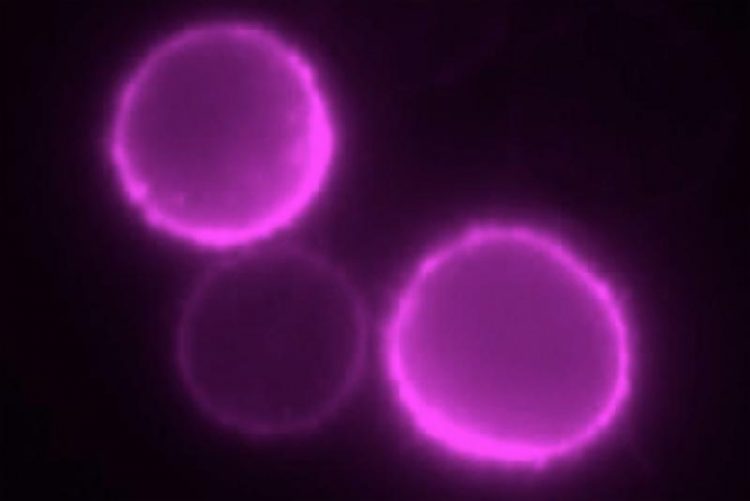Flipping the switch to stop tumor development

Expanding B-cell tumors. Image: Michael Reth
The mammalian immune system consists of millions of individual cells that are produced daily from precursor cells in the bone marrow. During their development, immune cells undergo a rapid expansion, which is interrupted by phases of differentiation to more mature lymphocytes.
Alternate phases of proliferation and differentiation occur also during the maturation of antibody-producing B cells. Researchers in Prof. Dr. Michael Reth’s laboratory have come one step closer to understand how the proliferation to differentiation switch in B lymphocytes works, thereby providing new insights into the development of the most common types of tumors in children and potential therapies thereof. The team has published its study in the journal Nature Immunology.
Because the switch induces differentiation, it limits the proliferation phase of precursor cells, so-called pre-B cells. If differentiation is blocked, pre-B cells continue to proliferate and this can lead to pre-B cell leukemia. The researchers have shown that the switch factor is a complex with two components: a small adaptor protein called B cell translocation gene 2 (BTG2) and the protein arginine methyl transferase 1 (PRMT1).
“We found that BTG2 is up-regulated upon pre-B cell differentiation and that an induced expression of BTG2 in pre-B cells stops their proliferation,” explains Dr. Elmar Dolezal, the first author of the published paper. How the BTG2/PRMT1 complex stops pre-B cell proliferation was shown by Dr. David Medgyesi: once activated by BTG2, PRMT1 specifically methylates the protein CDK4, thereby preventing its function in the cell cycle and further cell proliferation.
Interestingly, many tumor cells have either deleted the BTG2 gene or have silenced it. For example it is hardly expressed in B-Cell Acute Lymphoblastic Leukemia (B-ALL), the most common type of cancer in children. Using a mouse model, the authors of the study have shown that reintroducing BTG2 in such B-ALL tumor cells prevents further tumor development.
“We have discovered how BTG2 works as a tumor suppressor in pre-B cells and this may help to better understand and possibly develop a better treatment of B-ALL tumors,” summarizes Reth. “It will be important in the future to explore the exact mechanisms for expression and regulation of the BTG2 gene and to find ways in which we can introduce BTG2 in B-cell tumors to patients and thereby block the tumor cells’ proliferation.”
Michael Reth is Professor for Molecular Immunology at the Max Planck Institute for Immunology and Epigenetic (MPI-IE) and at the Faculty for Biology of the University of Freiburg. He is also director of the excellence cluster BIOSS, Centre for Biological Signaling Studies. This research was funded by the Max Planck Gesellschaft (MPG), the German Cancer Foundation and by the Deutsche Forschungsgemeinschaft via the collaborative research project 746, “Functional specificity through the coupling and modification of proteins”. Elmar Dolezal was funded by the Spemann Graduate School of Biology and Medicine at the University of Freiburg. David Medgyesi is one of the project leaders in Michael Reth’s laboratory.
Original publication:
Elmar Dolezal, Simona Infantino, Friedel Drepper, Theresa Börsig, Aparajita Singh, Thomas Wossning, Gina J. Fiala, Susana Minguet, Bettina Warscheid, David M. Tarlinton, Hassan Jumaa, David Medgyesi & Michael Reth (2017): The BTG2-PRMT1 module limits pre-B cell expansion by regulating the CDK4-Cyclin-D3 complex. In: Nature Immunology. doi:10.1038/ni.3774
Contact:
Prof. Dr. Michael Reth
E-Mail: BIOSS Centre for Biological Signalling Studies
University of Freiburg
Tel.: 0761/203-97374
E-Mail: michael.reth@bioss.uni-freiburg.de
https://www.pr.uni-freiburg.de/pm-en/2017/flipping-the-switch-to-stop-tumor-deve…
Media Contact
All latest news from the category: Life Sciences and Chemistry
Articles and reports from the Life Sciences and chemistry area deal with applied and basic research into modern biology, chemistry and human medicine.
Valuable information can be found on a range of life sciences fields including bacteriology, biochemistry, bionics, bioinformatics, biophysics, biotechnology, genetics, geobotany, human biology, marine biology, microbiology, molecular biology, cellular biology, zoology, bioinorganic chemistry, microchemistry and environmental chemistry.
Newest articles

NASA: Mystery of life’s handedness deepens
The mystery of why life uses molecules with specific orientations has deepened with a NASA-funded discovery that RNA — a key molecule thought to have potentially held the instructions for…

What are the effects of historic lithium mining on water quality?
Study reveals low levels of common contaminants but high levels of other elements in waters associated with an abandoned lithium mine. Lithium ore and mining waste from a historic lithium…

Quantum-inspired design boosts efficiency of heat-to-electricity conversion
Rice engineers take unconventional route to improving thermophotovoltaic systems. Researchers at Rice University have found a new way to improve a key element of thermophotovoltaic (TPV) systems, which convert heat…



